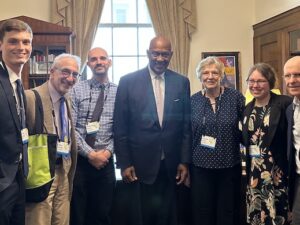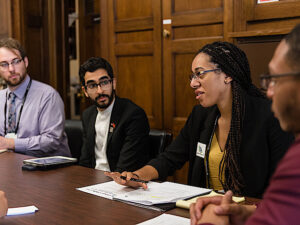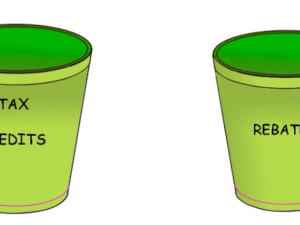By Syeda Hiba Naqvi
With CCL’s recent policy expansion into areas such as healthy forests, building electrification and efficiency, and clean energy permitting reform, it’s important to start building relationships in these sectors now for a greater chance at success later.
One instance of CCL expanding relationships and collaborating with other organizations was at CCL’s Big Tent Climate Talk in January. CCL’s Manager of Stakeholder Engagement and Government Affairs, Kyle Kammien, talked with Dr. Luis Aguirre-Torres, the Senior Advisor at Rewiring America, about shifting toward cleaner energy alternatives by electrifying as many homes and businesses as possible.
Dr. Aguirre-Torres began by explaining that climate change became a reality as a result of human actions and infrastructural revolution over the years. He recalls that once he recognized the impacts of climate change in his own community, he decided to become an active voice for climate action and to help fix the planet. Dr. Aguirre-Torres explained in his discussion with Kyle that there are different approaches to combating climate change and that CCL volunteers should take comfort in knowing that we are not alone.
Dr. Aguirre-Torres discovered the non-profit “Rewiring America” while he was working toward electrification in Mitika, Mexico. Rewiring America works toward its mission of electrifying homes, businesses, and communities by developing “accessible, actionable data and tools.”
Dr. Aguirre-Torres introduces a concept that Rewiring America believes in known as shared abundance, which means that, in Dr. Aguirre-Torres’s words, “if we do things right, we can move toward a model of sustainable prosperity that can be shared by everybody.”
Dr. Aguirre-Torres explains that electrification is a multifaceted endeavor that can bring a variety of benefits. It will lower energy costs for consumers and help improve indoor air quality, leading to healthier homes and buildings. This is a benefit to the climate movement, considering that “87% of emissions come from energy” emitted by people driving cars, heating homes, doing laundry, cooking food, and other daily tasks. Dr. Aguirre-Torres highlights that it’s crucial to optimize electrification because of its relevance in day-to-day life. With this, Dr. Aguirre-Torres focuses the lens on the consumer side of energy consumption, along with talking about the big power generation and fossil fuel extraction companies. Dr. Aguirre-Torres talks about the importance of spreading information not just to policy makes, but especially everyday people, since 42% of our energy-related emissions come from decisions made around the kitchen table, meaning everyday discussions around which car to buy, or which type of stove to use in the kitchen, lay at the heart of the electrification discussion.
But to plan for the present and the future, we have to understand the past. Dr. Aguirre-Torres pivots to the origins of today’s energy and fuel consumption worries, which started in the 1970s. A shortage of gas in America created federal concern about supplying “the necessary gas and energy for what the country needs, especially considering the way the country has been growing,” Dr. Aguirre-Torres explains. This conscious analysis shifted the narrative to efficiency and new energy standards for buildings like “Energy Star” and “Miles Per Gallon” for cars.
Now, Dr. Aguirre-Torres says, the conversation needs to shift from efficiency in using fossil fuel energy to not using fossil fuels at all due to the consequences of extracting, processing, and using them. Dr. Aguirre-Torres and Rewiring America reaffirm that “Electrification is efficiency” as fossil fuel energy produces significant energy waste.
Electrification’s major justification also comes from not only cleaner energy but also the cost-saving benefits through tax incentives, which is around “$1800 saved on average by American households if they electrified.” This would mean immediate economic benefit for people, many of whom could use the financial incentives due to circumstances such as low income, inflation, and unemployment.
Moving toward electrification, not just in powering homes but also appliances, cars, and other machinery, can change the market default, making electrification the most convenient, affordable, and accessible option to purchase and install. The Inflation Reduction Act (IRA) has been monumental because it creates a sort of “electric bank account” for the entire nation to switch to cleaner energy like electric cars, appliances, heat pumps and so on. Since there is substantial funding available to go toward electrification as well as rebates, tax breaks, and other incentives that people may not be familiar with, Dr. Aguirre-Torres urges people to take advantage of these incentives. Specifically, the IRA has set aside $858 billion for residential electrification.
Rewiring America’s website has a calculator for how much money in incentives you may be eligible for as a result of the Inflation Reduction Act; the calculator is easy to use, and requires you to answer a few short questions. This calculator, along with case studies on different household profiles and reviews of various categories of electric appliances, are all part of Rewiring America’s effort in guiding people to choose greener, cleaner solutions for their homes. This involves working with the federal government to create a “clearinghouse of what’s available,” according to CCL Senior Business Relations Representative Kyle Kammien.
Organizations like Rewiring America are working toward creating these helpful guides to provide people with information on what help is available from the federal, state, and local governments in terms of IRA subsidies and electrifying homes. As CCL moves toward broader clean energy horizons, we’re excited to work alongside groups like Rewiring America to create the political will for a livable world.
Syeda Hiba Naqvi is the CCL Spring 2023 Communications Intern. As a student of Public Policy, she hopes to work in climate policy and write about social and environmental issues impacting people in an ever-changing global climate. She is excited to be helping CCL in their crucial work.





